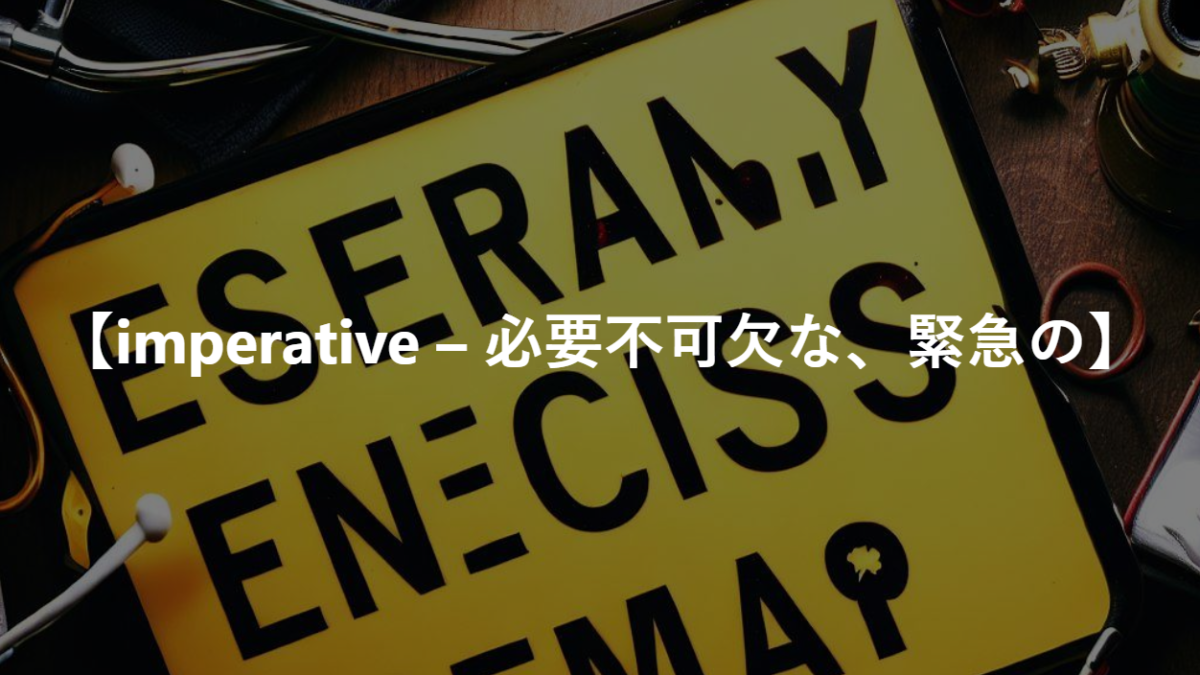語源・類義語・反対語・例文
【imperative – 必要不可欠な、緊急の】という単語の語源とか由来を知っていますか?
「Imperative」は、ラテン語の「imperativus」から派生しています。これは「命令的な」という意味の形容詞で、動詞「imperare」から来ています。この動詞は「命令する」「指図する」という意味を持ち、「in」(向けて)と「parare」(準備する)という単語から成り立っています。元々は、権威ある命令や指示を意味する言葉として使われていました。
時間が経つにつれて、「imperative」は、単に命令を表すだけでなく、「絶対に必要な」や「緊急の」という意味を持つ形容詞として英語で使われるようになりました。この変化は、命令や必要性が強く関連しているという考え方から生まれたものです。すなわち、何かが「imperative」であるとは、それが避けがたい要件や、行動を要求するほど重要であることを意味するようになりました。
The word “imperative” is derived from the Latin “imperativus,” an adjective meaning “commanding,” which comes from the verb “imperare,” meaning “to command” or “to order.” This verb is formed from the words “in” (towards) and “parare” (to prepare). Originally, it was used to signify authoritative commands or instructions.
Over time, “imperative” has evolved in English not only to signify a command but also to describe something as “absolutely necessary” or “urgent.” This transition stems from the idea that a command or necessity is compelling. Thus, when something is described as “imperative,” it implies that it is an unavoidable requirement or is so important that it demands immediate action.
この単語の類義語・反対語を教えてください。
類義語
- Essential – 本質的な。
- Crucial – 非常に重要な。
- Vital – 生命に関わる、不可欠な。
- Mandatory – 義務的な。
- Urgent – 緊急の。
- Necessary – 必要な。
- Compulsory – 強制的な。
- Pressing – 差し迫った。
反対語
- Optional – 任意の。
- Unnecessary – 不要な。
- Extraneous – 余計な。
- Nonessential – 本質的でない。
- Voluntary – 自発的な。
- Dispensable – なくてもよい。
- Insignificant – 重要でない。
この単語に似た単語で間違いやすい単語はありますか?
- Imperious: この単語は「命令的な」「横暴な」という意味です。態度や振る舞いが支配的で、他人を支配しようとするさまを表します。「Imperative」と混同しやすいですが、「Imperious」は人の態度に関するもので、「Imperative」は事態や物事の必要性や緊急性を表します。
- Impervious: 「影響を受けない」「通さない」という意味です。何かが他の物質や意見、感情などに対して透過性や影響を受けない状態を指します。形容詞としては「Imperative」と音が似ていますが、意味は全く異なります。
- Important: 「重要な」という意味で、「Imperative」と意味が近いですが、程度の強さに差があります。「Imperative」は「絶対に必要な」というより強い緊急性を持っているのに対し、「Important」は重要ではあるものの、必ずしも即座の行動や解決を要求するわけではありません。
この単語を使った例文を5つほど教えてください。
It is imperative that we find a solution to this problem immediately.
(この問題に対して即座に解決策を見つけることが必要不可欠です。)
Following the doctor’s instructions is imperative for a speedy recovery.
(迅速な回復のために、医師の指示に従うことが緊急です。)
It’s imperative to prioritize your tasks to meet the deadline.
(締切に間に合わせるために、タスクを優先することが必要不可欠です。)
Safety measures are imperative in high-risk environments.
(高リスクの環境では安全対策が不可欠です。)
The government has issued an imperative warning about the approaching hurricane.
(政府は接近するハリケーンについて緊急の警告を発しました。)
【imperative – 必要不可欠な、緊急の】のコロケーション
- Absolutely imperative – 絶対に必要不可欠な: 何かが非常に重要で、避けて通ることができない場合に使用されます。強調するために「absolutely」が前に来ます。
- Morally imperative – 道徳的に必要不可欠な: 行動や決定が道徳的な観点から見て絶対に必要であることを示します。特に倫理的な文脈で使われることが多いです。
- Socially imperative – 社会的に必要不可欠な: ある事項が社会の安定や発展にとって極めて重要である場合に使われます。社会的責任や義務に関連する状況で用いられることが多いです。
- It is imperative that – …することが必要不可欠である: ある行動や条件が非常に重要であることを示すために使われます。後に続く文や節で具体的な必要条件や行動を説明します。
- Imperative to success – 成功に必要不可欠な: 成功を達成するために特定の条件や行動が絶対に必要であることを示します。目標や成果を達成する上で欠かせない要素について言及する際に用いられます。
「Imperative」は、「必要不可欠な」または「緊急の」という意味を持つ形容詞で、多くの場合、何かが非常に重要であること、または即座の注意や行動を必要とする状況を示すために使われます。では、「imperative」という単語がどのようにして様々なコロケーションで用いられるかを見てみましょう。
まず、「Absolutely imperative」は、何かが絶対に避けられないほど重要であると強調したい時に使用されます。このフレーズは、特定の状況や条件が絶対に必要であるという点を強く主張しています。
次に、「Morally imperative」は、ある行動や決定が道徳的観点から見て非常に重要であることを示します。これは特に、倫理的な判断や道徳的な行動が求められる文脈で使われるフレーズです。
「Socially imperative」は、ある事柄が社会の安定や福祉にとって非常に重要であるときに使われます。この表現は、社会的な責任や義務が関わる場合に特に適しています。
「It is imperative that」は、ある条件や行動が極めて重要であることを示すために使われる構文です。これは、特定の状況下で何をすべきか、または何が必要かを明確に指示しています。
最後に、「Imperative to success」は、成功を達成するためにある条件や行動が絶対に欠かせないという状況を示すために使用されます。これは、目標達成に不可欠な要素を強調する場合に有効です。
これらのコロケーションを通じて、「imperative」という単語がどのように様々な文脈で重要性や緊急性を表すために使われるかがわかります。それぞれが、道徳的、社会的、または個人的な成功といった異なる観点から、何かが特に重要である理由を伝えるために役立っています。
The term “imperative” is an adjective meaning “absolutely necessary” or “urgent,” and is often used to indicate something of great importance or a situation that requires immediate attention or action. Let’s explore how the word “imperative” is used in various collocations.
Firstly, “Absolutely imperative” is used when something is so critically important that it cannot be avoided. This phrase strongly asserts that a particular situation or condition is absolutely necessary.
Next, “Morally imperative” indicates that an action or decision is extremely important from a moral standpoint. This phrase is particularly used in contexts where ethical judgment or moral action is required.
“Socially imperative” is employed when something is very important for the stability or well-being of society. This expression is particularly apt when social responsibilities or obligations are involved.
“It is imperative that” is a construction used to state that a condition or action is highly important. This structure clearly dictates what should be done or what is needed under specific circumstances.
Lastly, “Imperative to success” is used to express that certain conditions or actions are absolutely essential for achieving success. This is effective when emphasizing elements crucial to the attainment of goals.
Through these collocations, we can see how the word “imperative” is used to express the importance or urgency in various contexts. Each one serves to convey why something is particularly important from different perspectives, such as moral, social, or personal success.
文法問題: “imperative” (必要不可欠な、緊急の)
- 品詞と使い方:
It is _________ that we act now to address the climate crisis.
(A) imperatively
(B) imperativeness
(C) imperative
(D) imperating
解答と解説:
(C) imperative 空欄には、it is の後に補語となる形容詞が必要です。imperative は「必要不可欠な」「緊急の」という意味の形容詞です。
– - 名詞形:
The _________ of the situation demanded immediate action.
(A) imperatively
(B) imperativeness
(C) imperative
(D) imperating
解答と解説:
(B) imperativeness 空欄には主語となる名詞が必要です。imperativeness は「緊急性」「必要性」という意味の名詞です。
– - 類義語:
It is _________ that we find a solution to the problem before it’s too late.
(A) imperative
(B) crucial
(C) vital
(D) all of the above
解答と解説:
(D) all of the above imperative, crucial, vital はいずれも「必要不可欠な」「極めて重要な」という意味で、この文脈ではすべて適切です。
– - 反意語:
The task was _________, so we could take our time completing it.
(A) imperative
(B) optional
(C) unnecessary
(D) all of the above
解答と解説:
(D) all of the above 文脈から、空欄には imperative の反意語が入ることがわかります。optional, unnecessary は「任意の」「不必要な」という意味なので、適切です。
– - 誤文訂正:
The imperatively of the situation required immediate evacuation of the building.
解答と解説: imperatively → imperativeness 空欄には主語となる名詞が必要です。imperatively は副詞なので、名詞 imperativeness に修正する必要があります。

